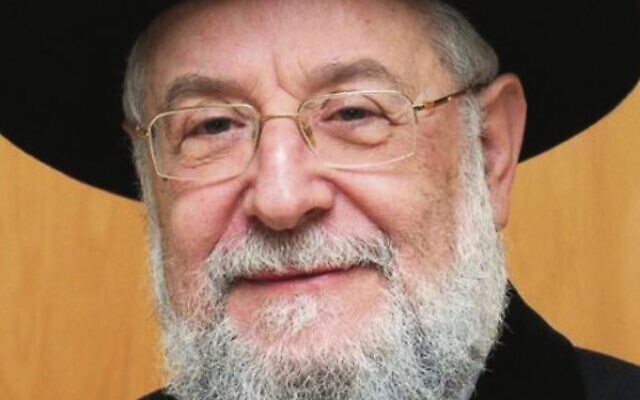Rabbi Lau in Australia
Brought here by high-profile business magnate Joseph Gutnick, Rabbi Lau is also visiting Melbourne and will speak at a major communal event at Chabad House of Caulfield tonight.
ISRAEL’s former Chief Rabbi Yisrael Meir Lau arrived in Australia this week in a visit during which he officially opened the renovated Launceston Synagogue yesterday (Wednesday).
Brought here by high-profile business magnate Joseph Gutnick, Rabbi Lau is also visiting Melbourne and will speak at a major communal event at Chabad House of Caulfield tonight.
Rabbi Lau’s flight from Israel was delayed by demonstrations around Ben Gurion airport.
Launceston Synagogue is a heritage-listed building in the CBD for which the budding local congregation bought land in the 1840s and built the shule in 1844, consecrating it two years later.
Among the early worshippers were Tasmanian Jewish convicts. In 1847, Tasmanian authorities permitted all Jews in Hobart and Launceston prisons to attend shule and refrain from work on Shabbat. Convicts with passes were permitted to be counted in a minyan but could not have honours bestowed on them.
The shule operated on the premises until 1871, and again during the 1930s – after a major renovation – until 1961. It was reopened in 1984. It was classified under the National Trust as a heritage-listed building in 1989. The latest renovations have ushered in another new lease on life.
Rabbi Lau, a father of eight, served as the Ashkenazi chief rabbi of Israel from 1993 to 2003. The Holocaust child survivor was appointed chairman of the Yad Vashem Council, a position he holds today, and was the founder of International March of the Living.
Born in Poland in 1937, his father Rabbi Moshe Chaim Lau, the last chief rabbi of their town, Piotrkow Trybunalski, would perish at Treblinka.
The young Lau was taken from his mother Chaya and imprisoned in a Nazi slave labour camp and later at Buchenwald. He attributes his survival to his elder brother Naphtali Lau-Lavie, who concealed him at great risk and with the cooperation of other prisoners.
Making aliyah to pre-state Israel in 1945, he was raised by an aunt and uncle, studied at Kol Torah yeshivah and other seminaries, and received smichah in 1961.
Rabbi Lau served as chief rabbi of Netanya from 1978 to 1988, becoming a popular orator.
Acclaimed among Charedi and Modern Orthodox communities in Israel, and Sephardi and Ashkenazi Jews, he became known as the “consensus rabbi”. But his stances on non-Orthodox streams of Judaism have drawn criticism, with protests from the Reform and Masorti movements when he was awarded the Israel Prize in 2005.
Drawing on his Holocaust childhood, Rabbi Lau once reflected on Israeli unity: “Let’s sit down together and let’s live together. We always knew how to die together. The time has come for us to know also how to live together.”


comments